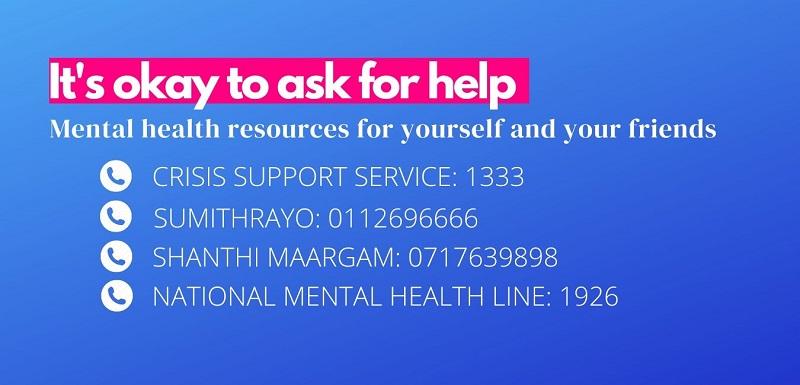01 Jul 2020 - {{hitsCtrl.values.hits}}

By Yumiko Perera
When you hear of suicide, you often wonder why someone would want to take their own life. Although it’s hard to imagine what led a friend, a family member or a celebrity to take such a drastic step, the truth is that suicide isn’t an easy subject to talk about, and neither is facing the consequences that come with it. You may wonder about the possible warning signs you may have missed, or what you could have done in order to prevent someone from opting to take their life in the first place. Although factors like substance abuse, untreated depression, various other mental disorders and other factors such as social, economic and cultural stressors, all lead to a higher risk; suicide does not have one single cause.
Speaking with the Daily Mirror, Dr. Udena Attygalle, renowned Consultant Child and Adolescent Psychiatrist at the Kalubowila Hospital, shed light on the importance of open discussion, raising awareness, how one should pick up on the warning signs as well as the impact it has on adolescents and people in general.
“Picking up on the warning signs as early as possible could help save a life. Although it might be easier if they openly express their distress, that isn’t always the case. Even a slight change in behavior could be an indication. They may act differently from their usual patterns of expected behaviour.
They may be detached, and withdrawn from usual social activities, or they may even seem more active but in an unusual manner. They may also be more irritable easily getting angry and taking more time to calm down, restless, agitated, and anxious or constantly on edge, while others may seem very lethargic and finding it difficult to concentrate. You might also detect a lot of negativity and hopelessness in their thinking.
It is important not to disregard a person when they express how they are truly feeling. If they do not express openly, as happens quite often, it becomes much more difficult to identify warning signs. However, it is important to be patient as people display distress non-verbally too. It’s a matter of being a little more sensitive and a little more receptive,” Dr. Attygalle opined.
Having a solid support system, quite often being their friends and family, knowing that they are understood, previous experiences of coping, mental health issues, whether they are in a safe environment, are all factors that have a big hand when it comes to detecting the warning signs firsthand.
While some people externalize their distress, others internalize it. Many people who visibly display distress are able to cope with it in adaptive ways. The important things might be to be sensitive to changes in behaviour and thinking that indicate distress and also understanding whether they are able to cope with it in an adaptive way, or whether they need to seek help.
While taking initiative to help increase awareness and decrease stigma around mental illness is key, it is also important to assure people that help is available, and suicide shouldn’t be the last resort. Sri Lanka Sumithrayo is an organization that has solely dedicated themselves to providing emotional support to those in distress for over four decades.
Speaking with the Daily Mirror, Chairperson Kumudini De Silva said, “Emotions are the driving forces that determine everything we do. I think it’s extremely important to be non-critical and non-judgmental, especially when it comes to sensitive issues such as suicide and mental health.”
“Children are often taught to hold back their feelings. They are taught at a very tender age that crying and venting is something that is looked down upon. I feel that’s the sort of mindset that needs to be changed. Sharing your problems with someone you trust should be seen as a healthy outlet,” Kumudini said.
“While our prime objective is to provide emotional support to those in despair and distress, bringing down the number of suicides in the country is paramount. When we meet somebody in distress, our main priority is to put them at ease so that they would feel comfortable enough to open up to us,” she added.
While encouraging conversation, addressing the recurring mental health crisis is essential, reaching out and seeking help should be treated as the norm, taking a minute to reach out to someone, be it a family member, friend, colleague or even a stranger could positively alter the course of somebody else’s life. A little kindness sure goes a long way, and making yourself available for someone could possibly be life-altering. There’s still a powerful stigma attached to mental illness, which often seen in most suicides. And that is precisely why we should be looking at open dialogue as a key for prevention.

04 Jan 2025 2 hours ago
04 Jan 2025 3 hours ago
04 Jan 2025 4 hours ago
04 Jan 2025 4 hours ago
04 Jan 2025 4 hours ago